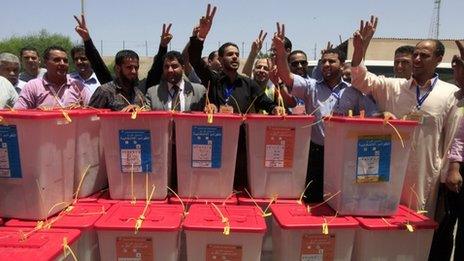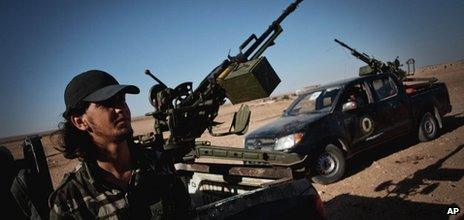Has Libya bucked the Islamist trend?
- Published

More than 100 parties competed in the landmark elections
It is difficult to sum up the alliance of parties that has done so well in Libya's first elections since the overthrow of Col Muammar Gaddafi.
The National Forces Alliance (NFA), led by ex-interim Prime Minister Mahmoud Jibril, gained more than double the seats of its Islamist rivals.
So should its MPs be described as secularist liberals or moderate modernists?
The reality is that those in the alliance are largely unknown, expect for Mr Jibril - whose face was one everyone recognised when they went to the polls.
When it comes to their politics, Libyans certainly believe that the NFA is "liberal", but the word "secular" is not used.
Mr Jibril himself has already declared that his party shall refer to Sharia for guidance in legislation.
So do these final preliminary results, pending a two-week window for any legal appeal, mean the conservative North African country is less religious than neighbouring Tunisia and Egypt, where Islamists did well in recent post-revolutionary elections?
Not really.
'Tired of preachers'
Libyans do not need politicians to tell them how to be good Muslims, says 18-year-old Heba, a tall, model-thin girl who presents an Arabic music programme on radio.
They want the parliament to deal with more pressing concerns, she explains.
"It's not like we expect nightclubs and things like that to suddenly open their doors here," she says.
"We have things to take care of like education and health."
The number of people who found the mere existence of religious parties an offensive concept was astonishing.
"We're all Muslims here! Who do they think they are preaching to us? They're not more religious than us" were common reactions heard in cities.
Libyans are ultimately tired of ideological preachers - they endured it for more than 40 years with Col Gaddafi's eccentric and confusing semi-Islamic, socialist ramblings.
And parties like the Muslim Brotherhood are seen as having hijacked Tunisia and Egypt's revolutions.

One of the key priorities for the new assembly will be to oversee disarmament
But it is not clear whether the centrist NFA will dominate the 200-member National Assembly because 120 seats are reserved for independents whose allegiances are not yet known.
In the end a grand coalition could be formed, which may or may not include the biggest loser in this recent election - The Nation Party led by former al-Qaeda-linked Abdelhakim Belhaj - which gained no seats at all on the party-list.
'Aspirin needed'
And for the first time women are now about to take up an active, public role in Libyan politics, with 33 gaining seats in the assembly.
But finding consensus on the conflicting regional needs will be hard.
"We'll probably need a lot of aspirin," one independent candidate, who did not make it to the assembly, jested some weeks ago.
Top of the issues that the country's MPs need to address is security.
They will need to ensure the disarmament of various gang-like militias who played no role in the conflict as well as the unification of brigades who did under a single official security umbrella.
The key to solving many of the issue lies in the economy.
The country certainly has enough oil revenues to help kick-start the private sector, which is desperately needed.
Libyans are already eagerly awaiting the next step of their new-found freedom - the drafting of a constitution, a process to be overseen by the national assembly, which they hope will seal their new democratic path.